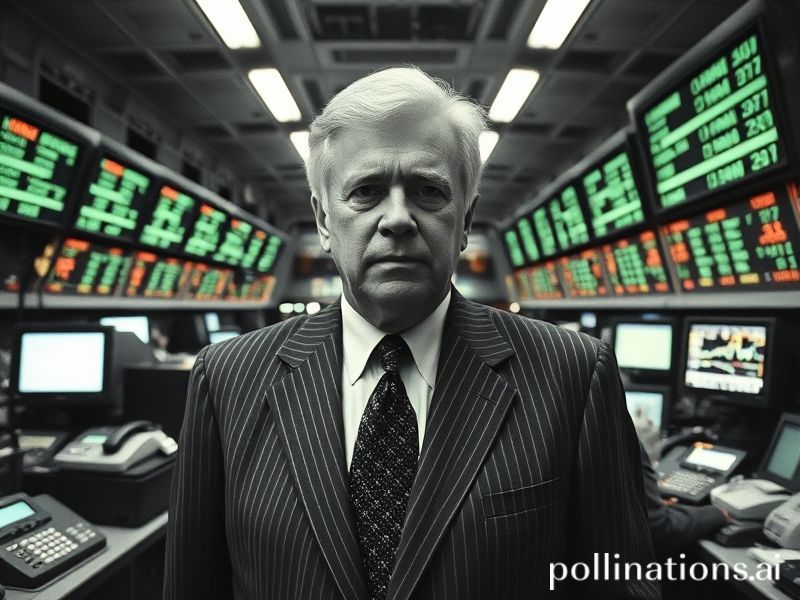Howard Rubin’s Global Shell Game: When Capitalism’s House of Cards Gets an Ocean View
**The Sorcerer’s Apprentice of Wall Street: Howard Rubin’s Global Game of Mirrors**
*By Our Correspondent Somewhere Between Luxembourg and a Hangover*
Somewhere south of Manhattan—where the Hudson still pretends to be a river and not a liquid ledger—Howard Rubin used to sit in a trading room so aggressively air-conditioned his colleagues kept ski masks in their desk drawers. The year was 1986. Michael Douglas was busy convincing the world that “greed is good,” while Rubin, then a 34-year-old wunderkind at Merrill Lynch, was quietly proving that greed could also be *spectacularly* leveraged. His colleagues called him “the human Cray” because his brain seemed to overclock reality itself; his detractors, less poetically, called him “the guy who could misplace a decimal and still make the bonus pool bigger.” Both were right.
Fast-forward four decades, and Rubin’s name still ricochets through the glass atria of global finance like a stray bullet in a Bond film. The current chapter—an involuntary cameo in multiple civil suits filed from New York to the Cayman Islands—alleges that certain “alternative investment vehicles” he oversaw turned out to be about as alternative as a Ponzi scheme with better branding. Plaintiffs range from a Norwegian pension fund (apparently eager to diversify from fjords into fiscal fiascos) to a Singaporean family office that mistook opacity for sophistication. The sums involved are large enough to make a Swiss banker blush, assuming the Swiss still possess that gland.
International finance, of course, loves a good morality play, especially when the moral arrives gift-wrapped in plausible deniability. Regulators in London, Zurich, and Hong Kong have each opened polite inquiries—polite because shouting might spook the markets, and markets spook easily. Meanwhile, the European Central Bank has issued a bulletin reminding everyone that “transparency is paramount,” a phrase economists translate as “please don’t look at our balance sheet either.” The Bank for International Settlements in Basel—the central bank to central banks, housed in a tower that looks suspiciously like a Bond villain’s lair—has convened a working group whose first deliverable will be a 400-page PDF nobody will read, followed by a catered lunch everyone will attend.
Rubin himself, now 71, has retreated to what the press release calls “a period of personal reflection,” which is finance-speak for lawyering up in South Florida. His spokesperson—an ex-diplomat who once negotiated trade disputes over cigars and single malt—assures us that “Mr. Rubin remains confident in the integrity of his strategies.” Translation: the algorithms were perfect; reality merely failed to cooperate.
The broader significance? Let’s zoom out. In the same week that Rubin’s travails hit Bloomberg’s terminal, Ghana defaulted on its Eurobonds, the Bank of Japan widened its yield-curve band until it resembled a limbo stick, and a crypto exchange headquartered in a Seychelles mailbox announced it was “re-architecting trust.” All unrelated, yet all symptoms of the same planetary fever dream: capital sloshing around the globe looking for a story it can sell back to itself at a markup. Rubin is simply the latest narrator whose plot twist arrived a little early.
History will probably file him under “colorful footnote,” somewhere between the Hunt brothers’ silver corner and that Icelandic banker who bought a football club with other people’s futures. But for now, he serves as a convenient lightning rod for our collective cognitive dissonance: we demand alpha, but clutch pearls when leverage bites back. We insist on deregulation, then feign shock when the roulette wheel favors the house. And every time a Rubin surfaces, we pretend it’s a lone rogue instead of the system’s designated sin-eater.
So pour one out for Howard—preferably something aged 30 years, like his prime broker relationships. The planet will keep spinning, the algorithms will keep humming, and somewhere in a glass tower in Dubai, the next sorcerer’s apprentice is already rehearsing the same disappearing act. Just remember: if the pitch deck opens with the words “uncorrelated returns,” you might want to check that your passport is current and the exit row seat is unoccupied. Because in global finance, the only certainty is that someone, somewhere, is polishing a mirror big enough for us all to admire our own credulity.







